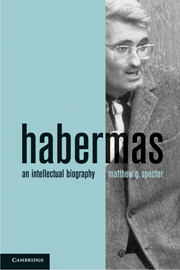Book contents
- Frontmatter
- Contents
- Acknowledgments
- HABERMAS: AN INTELLECTUAL BIOGRAPHY
- Introduction
- 1 The Making of a ′58er: Habermas's Search for a Method
- 2 Habermas as Synthesizer of German Constitutional Theory, 1958–1963
- 3 1961–1981: From the “Great Refusal” to the Theory of Communicative Action
- 4 Civil Disobedience, Constitutional Patriotism, and Modernity: Rethinking Germany's Link to “the West” (Westbindung), 1978–1987
- 5 Learning from the Bonn Republic: Recasting Democratic Theory, 1984–1996
- Conclusion
- Bibliography
- Index
5 - Learning from the Bonn Republic: Recasting Democratic Theory, 1984–1996
Published online by Cambridge University Press: 05 June 2012
- Frontmatter
- Contents
- Acknowledgments
- HABERMAS: AN INTELLECTUAL BIOGRAPHY
- Introduction
- 1 The Making of a ′58er: Habermas's Search for a Method
- 2 Habermas as Synthesizer of German Constitutional Theory, 1958–1963
- 3 1961–1981: From the “Great Refusal” to the Theory of Communicative Action
- 4 Civil Disobedience, Constitutional Patriotism, and Modernity: Rethinking Germany's Link to “the West” (Westbindung), 1978–1987
- 5 Learning from the Bonn Republic: Recasting Democratic Theory, 1984–1996
- Conclusion
- Bibliography
- Index
Summary
But moods – and philosophies in a melancholic “mood” – do not justify the defeatist surrender of the radical content of democratic ideals…If defeatism were justified, I would have had to choose a different literary genre, for example, the diary of a Hellenistic writer who merely documents, for subsequent generations, the unfulfilled promises of his waning culture.
On this proudly defiant note, Jurgen Habermas prefaced his magnum opus in political and legal theory, Between Facts and Norms: Contributions to a Discourse Theory of Democracy (1992). The tone provides a useful clue for situating and contextualizing his mature political thought. Because Habermas began the work in 1985 but completed it only in 1991, the work sits astride a historical chasm – represented by the collapse of the East German state in 1989 and the reunification of the East with West Germany in 1990 – making contextual interpretation of the work difficult. But keeping both eras in mind – both pre- and post-1989 – makes it possible to fundamentally reinterpret the work. Between Facts and Norms (BFN hereafter) wears a Janus face: Facing backwards, it culls the constitutional history of the Bonn Republic in search of its lessons; facing forward, it inaugurates a new chapter in left political theorizing after the end of the Cold War.
- Type
- Chapter
- Information
- HabermasAn Intellectual Biography, pp. 171 - 202Publisher: Cambridge University PressPrint publication year: 2010



